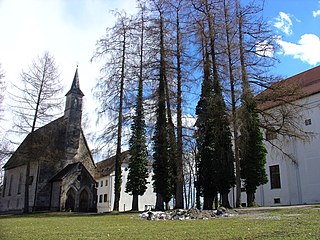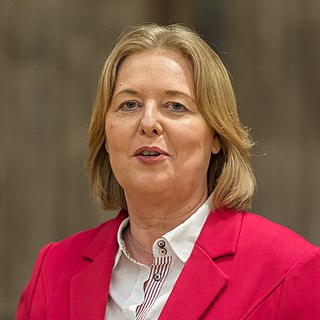
The Bundestag is the German federal parliament alongside the legally distinct body of the Bundesrat, which together function similar to a bicameral legislature while technically being two separate unicameral legislative entities. It is the only federal representative body directly elected by the German people. The Bundestag was established by Title III of the Basic Law for the Federal Republic of Germany in 1949 as one of the legislative bodies of Germany. It is thus the historical successor to the earlier Reichstag.

Germany is a democratic and federal parliamentary republic, where federal legislative power is vested in the Bundestag and the Bundesrat.

The president of Germany, officially titled the Federal President of the Federal Republic of Germany, is the head of state of Germany.

The Basic Law for the Federal Republic of Germany is the constitution of the Federal Republic of Germany.
In a parliamentary or semi-presidential system of government, a reserve power, also known as discretionary power, is a power that may be exercised by the head of state without the approval of another branch or part of the government. Unlike in a presidential system of government, the head of state is generally constrained by the cabinet or the legislature in a parliamentary system, and most reserve powers are usable only in certain exceptional circumstances.

The German Bundesrat is a legislative body that represents the sixteen Länder of Germany at the federal level. The Bundesrat meets at the former Prussian House of Lords in Berlin. Its second seat is located in the former West German capital of Bonn.
A convention, also known as a constitutional convention, is an uncodified tradition that is followed by the institutions of a state. In some states, notably those Commonwealth states that follow the Westminster system and whose political systems derive from British constitutional law, most government functions are guided by constitutional convention rather than by a formal written constitution. In these states, actual distribution of power may be markedly different from those the formal constitutional documents describe. In particular, the formal constitution often confers wide discretionary powers on the head of state that, in practice, are used only on the advice of the head of government, and in some cases not at all.
A joint committee is a committee made up of members of the two chambers of a bicameral legislature. In other contexts, it refers to a committee with members from more than one organization.
The Federal Convention, also known as the Federal Assembly, is, together with the Joint Committee, one of two non-permanent constitutional bodies in the institutional framework of the Federal Republic of Germany. It is convened solely for the purpose of electing the President of Germany, no later than 30 days before the expiration of a sitting president's term or within 30 days of the premature termination of a presidential term. The Federal Convention consists of all members of the federal parliament (Bundestag) and the same number of delegates from the 16 federated states. Those delegates are elected by the state parliaments for this purpose only.

The Reichsrat of the Weimar Republic was the de facto upper house of Germany's parliament; the lower house was the popularly elected Reichstag. The Reichsrat's members were appointed by the German state governments to represent their interests in the legislation and administration of the nation at the federal level. Its powers were relatively limited, making it considerably weaker than its predecessor, the Bundesrat of the German Empire (1871–1918). It could introduce legislation for the Reichstag to consider and veto laws that it passed, but the vetoes could be overridden. The Reichsrat also played a role in administering and implementing Reich laws.

The Federal Government is the chief executive body of the Federal Republic of Germany and exercises executive power at the federal level. It consists of the Federal Chancellor and the Federal Ministers. The fundamentals of the government's organisation, as well as the method of its election and appointment, along with the procedure for its dismissal, are set down in the sixth section of the German Basic Law (Grundgesetz).
The German Emergency Acts were passed on 30 May 1968 at the time of the First Grand Coalition between the Social Democratic Party of Germany and the Christian Democratic Union of Germany. It was the 17th constitutional amendment to the Basic Law, adding emergency clauses to ensure the federal government's ability to act in crises such as natural disasters, uprisings or war.

A parliamentary republic is a republic that operates under a parliamentary system of government where the executive branch derives its legitimacy from and is accountable to the legislature. There are a number of variations of parliamentary republics. Most have a clear differentiation between the head of government and the head of state, with the head of government holding real power and the head of state being a ceremonial position, similar to constitutional monarchies. In some countries the head of state has reserve powers to use at their discretion as a non-partisan "referee" of the political process. Some have combined the roles of head of state and head of government, much like presidential systems, but with a dependency upon parliamentary confidence. In general, parliamentary republics grant the highest sovereign powers to the parliament.

The chancellor of Germany, officially the federal chancellor of the Federal Republic of Germany, is the head of the federal government of Germany, The chancellor is the chief executive of the Federal Cabinet and heads the executive branch. The chancellor is elected by the Bundestag on the proposal of the federal president and without debate. During a State of defence declared by the Bundestag the chancellor also assumes the position of commander-in-chief of the Bundeswehr.

The Constitutional Convention at Herrenchiemsee was a meeting of constitutional experts nominated by the minister-presidents of the Western States of Germany, held in August 1948 at former Herrenchiemsee Abbey in Bavaria. It was part of the process of drafting and adopting the current German constitution, the Basic Law (Grundgesetz). The draft document prepared by the Herrenchiemsee convention served as a starting point for the deliberations of the Parlamentarischer Rat in Bonn during 1948 and 1949.

Federalism in Germany is made of the states of Germany and the federal government. The central government, the states, and the German municipalities have different tasks and partially competing regions of responsibilities ruled by a complex system of checks and balances.
The state of defence is the constitutional state of emergency in Germany if the country is "under attack by armed force or imminently threatened with such an attack". Established by a constitutional amendment in 1968 during the Cold War, this state of emergency gives the Federal Government extraordinary powers in wartime. It is laid down in Title Xa of the German Constitution. As of present, Germany has never been in the state of defence.

The Federal Constitutional Court is the supreme constitutional court for the Federal Republic of Germany, established by the constitution or Basic Law of Germany. Since its inception with the beginning of the post-World War II republic, the court has been located in the city of Karlsruhe, which is also the seat of the Federal Court of Justice.

The Bundesrat was the highest legislative body in the German Empire (1871–1918). Its members were appointed by the governments of Germany's constituent states to represent their interests in the German parliament. The popularly elected Reichstag was the lower house. The Constitution of the German Empire required that both the Bundesrat and the Reichstag approve laws before they came into force. The Bundesrat was responsible for the enactment of the laws, administrative regulations and the judicial resolution of disputes between constituent states. Its approval was required for declarations of war and, with certain limitations, the conclusion of state treaties.

Bärbel Bas is a German politician of the Social Democratic Party (SPD) who has been serving as the 14th president of the Bundestag since 2021. She has been a member of the German Bundestag since the federal election in 2009. She served as the deputy chairwoman of the SPD parliamentary group under the leadership of chairman Rolf Mützenich from 2019 to 2021.














